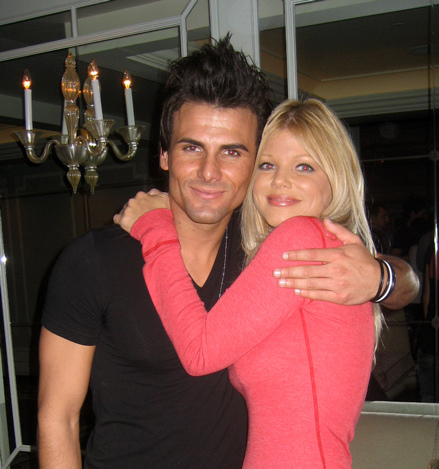Jeremy Jackson, who played Hobie Buchannon in the television series Baywatch, has decided he is addicted to anabolic steroids and human growth hormone in order to co-star in the reality TV show Celebrity Rehab. Jackson played Hobie, the son of David Hasselhoff’s character lifeguard Mitch Buchannon, on NBC from 1991 to 1999.
Jackson turned to bodybuilding (and anabolic steroids and human growth hormone) to overcome his methamphetamine addiction according to TMZ:
We’re told Jeremy — who played Hobie on the show — got into fitness a few years back as a way to help kick his meth addiction, and it worked … but what used to be a healthy hobby spiraled out of control … and now he fears for his life.
Sources close to Jeremy tell us, he’s not only addicted to the gym — he can’t stop injecting HGH (Human Growth Hormone) and testosterone (an anabolic steroid).
Jackson recently joined the cast of Celebrity Rehab with Dr. Drew for Season 5. However, in order to appear on Celebrity Rehab, unemployed actors seeking to make a comeback must meet the prerequisite of having a drug addiction.
“Celebrity Rehab” is the first television series to chronicle the real life experiences of a group of celebrities as they make the life-changing decision to enter themselves into a drug, alcohol, and addiction treatment program. They each have the sincere desire to achieve rehabilitation and recovery.
Leading the groups’ efforts at recovery is renowned addiction expert Dr. Drew Pinsky, Medical Director of the Department of Chemical Dependency Services at Southern California’s Las Encinas Hospital, and host of the long-running radio and television advice series “LOVELINE”.
Since Jeremy Jackson allegedly has stay clean from his methamphetamine drug addiction since 2000, he is appearing on Celebrity Rehab to treat his alleged steroid addiction. Dr. Drew Pinsky has previously claimed expertise with steroids due to his experience in with bodybuilding gym rats as a student in medical school according to an interview he gave to Playboy in the July 2008 issue:
I’ve thought about that a lot, actually. I knew all about steroids before anybody because I was in that world of bodybuilders and gyms when I was 20. These gym rats would confide in me because I was in medical school. They told me what they were doing, and then they would deny it to everybody else. I watched some guys go from 17-year-old nothings to Mr. America with endorsements. For them, it was as if you could go from being a novice pianist to Mozart in two years just by taking a pill. How could they not be tempted by that? Of course, I see them now and they’re dying from the stuff. There’s depression, mania, rage and physical consequences that will cut their life short by 10 to 20 years. It’s their choice. I’m not sure what to think about the ethics of it all, but I must admit it’s kind of exciting to watch these guys in baseball hitting the ball out of the park. And I don’t think Congress should spend billions of tax dollars to investigate it. It’s a player’s perogative.
Steroid addiction and steroid dependency, although popularly used in popular culture, is not currently a clinically recognized condition by the American Psychological Association (APA); some researchers have advocated changing the criteria in the Diagnostic and Statistical Manual of Mental Disorders (DSM) so that such a diagnosis could be made in future editions of the DSM.

Related Posts :
- "Moneyball" Movie is Not About Steroids to Dismay of Some Sportswriters
- Charlie Sheen Admits Using Steroids for Role of Baseball Player in "Major League"
- Accused Steroid User 50 Cent Accuses Boxer Pacquiao of Using Steroids
- Bodybuilders on Steroids Needed for Wonder Woman Television Series

